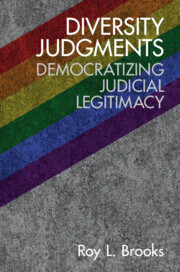Book contents
- Diversity Judgments
- Diversity Judgments
- Copyright page
- Dedication
- Contents
- Preface
- Acknowledgments
- Introduction
- Part I Asian Americans
- Part II African Americans
- 3 Brown v. Board of Education (Single-Race Schools)
- 4 Griggs v. Duke Power Co. (Employment Discrimination)
- 5 District of Columbia v. Heller (Right to Keep and Bear Arms)
- Part III Women
- Part IV Latinx
- Part V Native Americans
- Part VI LGBTQ
- Part VII Intersectionality
- Part VIII Outsiders v. Outsiders
- Part IX White Males
- Part X Situational Outsiders
- Index
5 - District of Columbia v. Heller (Right to Keep and Bear Arms)
from Part II - African Americans
Published online by Cambridge University Press: 10 March 2022
- Diversity Judgments
- Diversity Judgments
- Copyright page
- Dedication
- Contents
- Preface
- Acknowledgments
- Introduction
- Part I Asian Americans
- Part II African Americans
- 3 Brown v. Board of Education (Single-Race Schools)
- 4 Griggs v. Duke Power Co. (Employment Discrimination)
- 5 District of Columbia v. Heller (Right to Keep and Bear Arms)
- Part III Women
- Part IV Latinx
- Part V Native Americans
- Part VI LGBTQ
- Part VII Intersectionality
- Part VIII Outsiders v. Outsiders
- Part IX White Males
- Part X Situational Outsiders
- Index
Summary
Though the natural right of self-defense is deeply rooted in Western philosophy and culture, the right to keep and bear arms in American jurisprudence is largely derived from the Declaration of Right of 1689 (informally known as the English Bill of Rights). In response to King James II’s “endeavor to subvert and extirpate the Protestant religion,” the seventh declaration protects the right of “Protestants [to] have arms for their defense suitable to their conditions and as allowed by law[.]” Here for the first time the right to keep and bear arms was codified in England. This codified right was rooted in the right to self-defense. “British case law since 1330 … long recognized an absolute right to use deadly force against home invaders.” Lord Blackstone refers to the right to keep and bear arms as an “auxiliary right of the subject … of having arms for their defense, suitable to their condition and degree,” and that such a right is “a public allowance … of the natural right of resistance and self-preservation, when the sanctions of society and laws are found insufficient to restrain the violence of oppression.” It is on this philosophical and legal foundation that the Second Amendment to the Constitution rests. And it is this right that is brought to light in District of Columbia v. Heller.
- Type
- Chapter
- Information
- Diversity JudgmentsDemocratizing Judicial Legitimacy, pp. 150 - 170Publisher: Cambridge University PressPrint publication year: 2022



